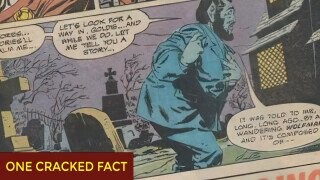Comic Writers Started Getting Credit Thanks To An Anti-Censorship Pun

It's comics week at One Cracked Fact! Stay tuned for more comic-based facts all week. We'll also be giving away a set of awesome graphic novels to one One Cracked Fact subscriber. Learn more here. And, if you dig Cracked's comic- (and non-comic) movie and TV coverage, sign up for the Cracked Movie Club newsletter, launching this Friday!
Starting in 1954, American comics fell under the authority of the Comics Code Authority, a group devoted to limiting what comics could be about. Much like Hollywood's Hays Code, the goal of the Comics Code was to use self-censorship to forestall any kind of censorship from the government. And much like with the Hays Code, this self-censorship proved stricter and more absurd than any kind of regulation the government could come up with.
The Comics Code banned nudity, seduction, and "sexual abnormalities." It banned "gruesome illustrations," "depravity," and "unnecessary gunplay." Every wrongdoer had to be punished, and every policeman and government official had to be portrayed respectfully. And, reflecting a moral panic that we've now mostly forgotten, comics were forbidden from including horror, with a ban specifically singling out zombies, vampires, and werewolves as verboten.
Don't Miss
In 1969, DC prepared an issue of their comic House of Secrets. "Stories calm me," says one character, breaking the fourth wall to introduce one story from the issue. "Let me tell you a story. It was told to me long ago by a wandering wolfman ... "
The censors jumped on that line. The comic couldn't say that. The Code strictly forbade references to werewolves, for reasons that made sense to them at the time. But editor Gerry Conway had a trump card: The following story ("The Stuff That Dreams Were Made Of") was by a guy actually named Wolfman, DC writer Marv Wolfman. And oh yeah, comic dialog is all in caps, so "WOLFMAN" can mean either "wolfman" or "Wolfman."
To complete the gag, the next page had to say "Script: Marv Wolfman." That was something DC at the time never did with these comic books, whose writers normally went uncredited. After this, though, every writer wanted their name on their stories, so DC began crediting them all.
This fact came from the new One Cracked Fact newsletter. Want more like this, straight from your email inbox, without any ads or popups? Join here:
For more on Marv Wolfman's long comic career, check out:
The 5 Most Insane Celebrity Cameos in Comic Books
4 Comic Crossovers That Stuck It to the Man
5 Famous Storylines You Didn't Know Were Written By Kids
Follow Ryan Menezes on Twitter for more stuff no one should see.
Top image: DC
